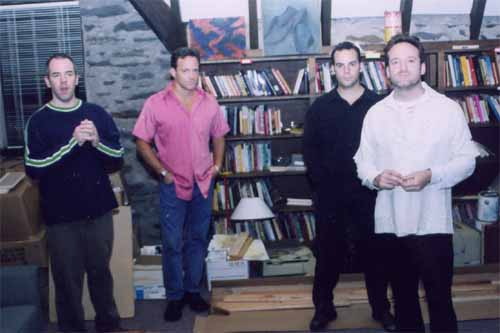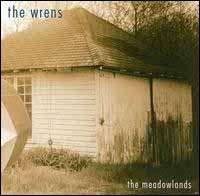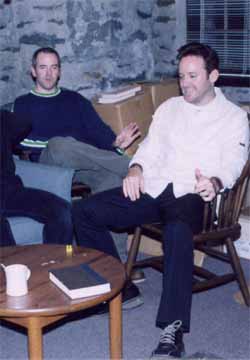|

Songs
from The Meadowlands
story by tim mcmahan
| |
|
Lazy-i: March 10, 2004
|
The Wrens
w/Criteria, Bottom Of The Hudson
Sunday, March 14,
Sokol
Underground
13th and Martha
| |
| The story
behind New Jersey indie band The Wrens' latest album, The Meadowlands,
is one of persistence over self-doubt. After scoring big with their
sophomore album, 1996's Secaucus, the band seemed to be on the verge of
climbing the post-grunge ladder to fame and fortune. But out of nowhere their
record label, Grass/Dutch East India, was purchased by the infamous music entrepreneur
Alan Melzter, who wanted to make The Wrens into a household name no matter the
cost. Unfortunately, the band wasn't interested and walked away. As the story
goes, Grass changed it name to Wind Up Records and signed a Tallahassee-based
Christian band called Creed. You know the rest. But while many believe label
games kept The Wrens from releasing another full-length for seven years, the stall
had more to do with the band's own battle to define its self-worth. "We
did spend a couple years dealing with lawyers and labels," said The Wrens
guitarist/vocalist Charles Bissell a.k.a. Charles Mexico via cell phone as he
walked through Brooklyn on the way to his girlfriend's home. "But after we
released an EP in '97, we were at a plateau with our music. We weren't moving
forward anymore. We were sort of exhausted. I had lost perspective and didn't
know what was good anymore and couldn't write lyrics. We needed to crank out another
album, but weren't sure why."
|
| |
By the summer of '99, The Wrens were close to
calling it quits. The album that they had expected to take four weeks to record
had lingered for six months. That's when Bissell received a call from someone
he'd met at the band's first-ever show -- an August 10, 1994, gig with Babe the
Blue Ox and Big Drill Car at the Capitol Bar & Grill in downtown Omaha. It
was Todd Baechle of the then little-known band The Faint. "Robb Nansel
(who runs Saddle Creek Records) and Todd wanted to set up a show with us in New
Jersey," Bissell said. "We kept putting them off, trying to tell them
we weren't playing anymore, which sounded preposterous since we were six months
into making the record. So we had a nifty loft party for them in Hoboken and played
drunk, which is very rare for us. They had just defined their new sound and played
this great set. We didn't play again for four years. They went on to become virtual
powerhouses." The Wrens plodded along after Hoboken, squeezing in recording
sessions at their Secaucus, New Jersey, home studio between day jobs. "There
seemed to be no end in sight because every song sucked, every idea was bad,"
Bissell said. "We didn't know what to do. There was insecurity on my part
over the quality of the recording itself. I'm not sure if I had it right. It was
the age-old saying that goes with home recording: It sounds great in your living
room and bad everywhere else." Bissell and the band found salvation
in, of all things, the mastering process. "We set up multiple mastering
sessions and brought in four or five songs at a time. The guy doing the mastering
was just great." The engineer was Alan Douches, who has worked with
a plethora of indie bands ranging from Alkaline Trio and Galaxy 500 to The Rapture
and Yes. "He made no value judgments and was super friendly," Bissell
said. "It was like a litmus test. We could hear what was good and what wasn't,
and see what he had to do to make it work. It answered a lot of questions. We
realized we were much closer than we thought. It lifted a huge burden, and helped
us get our bearings again with what we wanted to do musically."
|

|
"We
needed to crank out another album, but weren't sure why."
| |
| |

| |
"It
was the age-old saying that goes with home recording: It sounds great in your
living room and bad everywhere else."
| |
| The
result was The Meadowlands, released in September 2003 by Absolutely Kosher
Records. Hailed as a masterpiece by everyone from Pitchfork Media (an unheard
of 9.5 rating) to Magnet (album of the year), the album is a mixed bag
of somber, tonal songs that blend hushed vocals with quiet acoustic instruments;
jangly, big-hook pop tunes with pretty harmonies and bouncing power chords, and
jarring, distorted, take-no-prisoners rockers. The album goes every direction
at once, which Bissell said was to be expected considering the lengthy recording
process. "That's why the finished version is so weird," he said.
"When you hear The Meadowlands, you're hearing drum parts that were
recorded in the winter of '99 to songs that don't really exist anymore. We would
record a song, then pull it out later and do a different melody or chorus." After
years of playing in the studio, the band was once again determined to take the
stage. To do so meant relearning their own music. "We became our own cover
band," Bissell said of the rehearsal process. "It takes some time to
go back in and relearn the parts and mix and match them." He said the
band has been a little "freaked out" by the response to The Meadowlands
and their live shows. "It's wonderful and flattering," he said. "It's,
um, more than we expected. "The one thing that kept us together the
last four years was finishing the record. We thought that when the record was
over, maybe we'd call it quits. But the response was so good, and now we're touring
again. We came out of the whole thing more enthused about music than ever before
and on top of our game. I think we could make the next record in a week."
Back to  Published
in The Omaha Reader March 10, 2004. Copyright © 2004 Tim McMahan. All rights reserved.
| | |
| | | |
